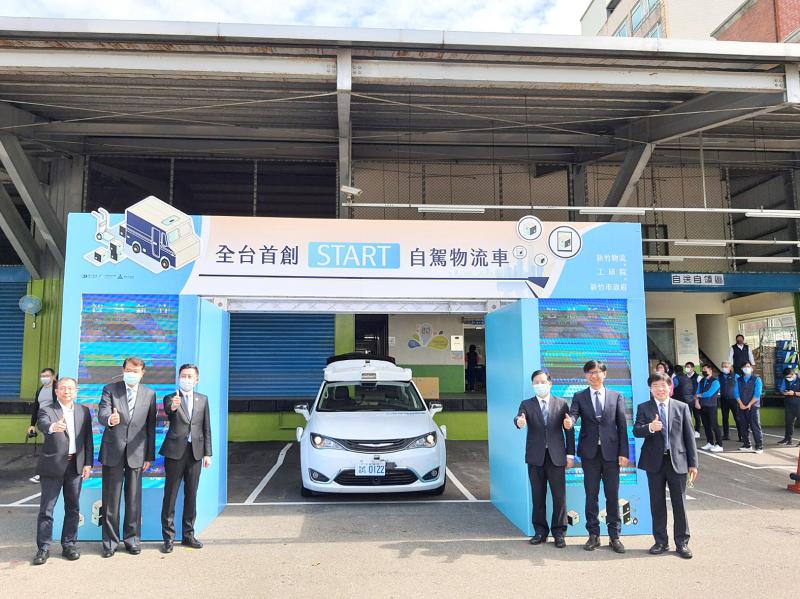Hsinchu City is planning to launch Taiwan’s first test program for driverless logistics vehicles, the Ministry of Economic Affairs said yesterday at an event to announce a collaboration among the ministry, the Industrial Technology Research Institute (ITRI, 工研院) and HCT Logistics Co (新竹物流).
The test program is to use 5-tonne trucks and travel 1.9km in some of the busiest traffic in Hsinchu City, the ministry said.
Driverless vehicle technology developed in other countries is not suitable for the circumstances and lane divisions found on local roads, such as the numbers of scooters and their allocations at stop lights, ITRI president Edwin Liu (劉文雄) said, adding that ITRI is filling the need for local development of the technology.

Photo: Hung Mei-hsiu, Taipei Times
“ITRI’s self-driving technology is specially designed for the traffic conditions of Taiwan and Asia. We have already overcome the challenges of mixed car and scooter traffic and the long rainy season,” Liu said.
This particular project is the first driverless pilot program to utilize vehicles for warehouse logistics, and the first to explore the burgeoning logistics market.
“HCT moves more than 450,000 parcels in the Greater Hsinchu area every month,” company president Pablo Lee (李正義) said yesterday. “After we successfully introduce self-driving technology, our first goal is to reduce traffic at our logistic center by 20 percent.”
The company also expects that the development of the program would help solve driver shortage problems and reduce driver workload, Lee said.
The ministry said that all self-driving vehicles are still in the testing phase, with full commercialization “still in the future.”
The testing of self-driving vehicles on public roads among regular traffic was made possible when the Unmanned Vehicles Technologies Innovative Experimentation Act (無人載具科技創新實驗條例) was passed in 2018. Before that, there was no legal framework to test driverless vehicles in open traffic.
Although there are vehicles in Taiwan with some degree of self-driving capability, drivers are only allowed to deploy the technology for assistance.

CAUTIOUS RECOVERY: While the manufacturing sector returned to growth amid the US-China trade truce, firms remain wary as uncertainty clouds the outlook, the CIER said The local manufacturing sector returned to expansion last month, as the official purchasing managers’ index (PMI) rose 2.1 points to 51.0, driven by a temporary easing in US-China trade tensions, the Chung-Hua Institution for Economic Research (CIER, 中華經濟研究院) said yesterday. The PMI gauges the health of the manufacturing industry, with readings above 50 indicating expansion and those below 50 signaling contraction. “Firms are not as pessimistic as they were in April, but they remain far from optimistic,” CIER president Lien Hsien-ming (連賢明) said at a news conference. The full impact of US tariff decisions is unlikely to become clear until later this month

With an approval rating of just two percent, Peruvian President Dina Boluarte might be the world’s most unpopular leader, according to pollsters. Protests greeted her rise to power 29 months ago, and have marked her entire term — joined by assorted scandals, investigations, controversies and a surge in gang violence. The 63-year-old is the target of a dozen probes, including for her alleged failure to declare gifts of luxury jewels and watches, a scandal inevitably dubbed “Rolexgate.” She is also under the microscope for a two-week undeclared absence for nose surgery — which she insists was medical, not cosmetic — and is

GROWING CONCERN: Some senior Trump administration officials opposed the UAE expansion over fears that another TSMC project could jeopardize its US investment Taiwan Semiconductor Manufacturing Co (TSMC, 台積電) is evaluating building an advanced production facility in the United Arab Emirates (UAE) and has discussed the possibility with officials in US President Donald Trump’s administration, people familiar with the matter said, in a potentially major bet on the Middle East that would only come to fruition with Washington’s approval. The company has had multiple meetings in the past few months with US Special Envoy to the Middle East Steve Witkoff and officials from MGX, an influential investment vehicle overseen by the UAE president’s brother, the people said. The conversations are a continuation of talks that

CHIP DUTIES: TSMC said it voiced its concerns to Washington about tariffs, telling the US commerce department that it wants ‘fair treatment’ to protect its competitiveness Taiwan Semiconductor Manufacturing Co (TSMC, 台積電) yesterday reiterated robust business prospects for this year as strong artificial intelligence (AI) chip demand from Nvidia Corp and other customers would absorb the impacts of US tariffs. “The impact of tariffs would be indirect, as the custom tax is the importers’ responsibility, not the exporters,” TSMC chairman and chief executive officer C.C. Wei (魏哲家) said at the chipmaker’s annual shareholders’ meeting in Hsinchu City. TSMC’s business could be affected if people become reluctant to buy electronics due to inflated prices, Wei said. In addition, the chipmaker has voiced its concern to the US Department of Commerce